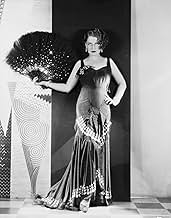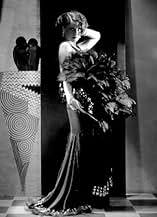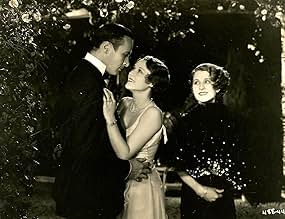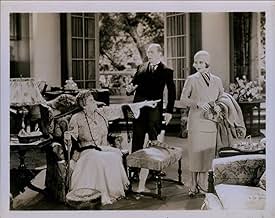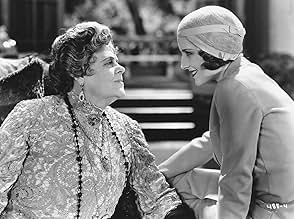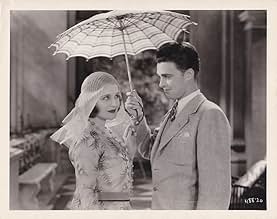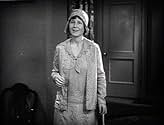Füge eine Handlung in deiner Sprache hinzuA housewife divorces her self-centered husband. Years later, she attends a party where her ex is pursuing another woman. Unbeknownst to him, she is the same ex-wife he'd neglected, now trans... Alles lesenA housewife divorces her self-centered husband. Years later, she attends a party where her ex is pursuing another woman. Unbeknownst to him, she is the same ex-wife he'd neglected, now transformed into a fashionable socialite.A housewife divorces her self-centered husband. Years later, she attends a party where her ex is pursuing another woman. Unbeknownst to him, she is the same ex-wife he'd neglected, now transformed into a fashionable socialite.
- Regie
- Drehbuch
- Hauptbesetzung
- Auszeichnungen
- 1 wins total
- Bob Brown
- (as Rod LaRocque)
- Wallace
- (as Tyrrell Davis)
- Struthers
- (as William O'Brien)
- Bobby Brown - 8 Years Old
- (Nicht genannt)
- Mrs. McIntyre
- (Nicht genannt)
- The Brown's Little Girl
- (Nicht genannt)
- Helen Hibbard
- (Nicht genannt)
- Bobby Brown - 5 Years Old
- (Nicht genannt)
Empfohlene Bewertungen
Three years later, Shearer is a glamorous and flirty divorcée. While summering in Paris, she has struck up a friendship with wealthy, older socialite Marie Dressler (as Mrs. "Boucci" Bouccicault). Ms. Dressler invites Shearer to her Long Island home, to socialize with some friends, and ask a favor. Dressler is worried about her granddaughter's relationship with a suave, worldly man. She wants young Sally Eilers (as Dionne) to marry Raymond Hackett (as Bruce), instead. Aware of Shearer's flirtatious conquests, Dressler asks her to lure the undesirable man away from Ms. Eilers. Shearer is stunned to discover the man is La Rocque, her ex-husband.
Shearer and Dressler make this a cute, entertaining play. They are in top form, giving guaranteed-to-be-popular performances, with enthusiasm and professionalism. The story is silly and predictable; yet, in a way which helps the humorous situation. And, the ending is quite clever. In fact, the comic "Let Us be Gay" may have aged better than Shearer's larger-produced, and more serious, "The Divorcée", which was released around the same time. The cast uniformly fine. La Rocque is better than his film with Lillian Gish; but, his role is not at all endearing. Gilbert Emery (as Towney) and Tyrell Davis (as Wallace) are funny supporting suitors.
Those not familiar with Norma Shearer may not realize it is she who appears as the dowdy wife in the opening scenes. This is Shearer as "Kitty" before her make-over. Watch the close-ups of Shearer with light, natural make-up, for a good look at an intriguingly beautiful woman.
******* Let Us Be Gay (1930) Robert Z. Leonard ~ Norma Shearer, Marie Dressler, Rod La Rocque
LET US BE GAY is an interesting little domestic comedy which features some tart dialogue (courtesy of celebrated screenwriter Frances Marion) & good performances. While perhaps a bit mawkish at times, this can probably be blamed on the difficulties with early sound technology which tended to limit action & movement.
Norma Shearer can be credited with appearing in this minor film, rather than using her undoubted clout as Irving Thalberg's spouse to insist upon only A-grade pictures. She is especially effective in her first few scenes, where dowdy flat makeup makes her almost unrecognizable. Her extreme transmogrification from goose to swan could only happen in Hollywood, but it's scarcely profitable to spend much time worrying about that.
Rod LaRocque doesn't come off too well as Shearer's adulterous husband. Quite popular during Silent days, the talkies were not especially kind to him and his career would suffer. Here his role is not in the least sympathetic and one has to wonder what masochistic impulse moves women to desire the cad so much.
Magnificent Marie Dressler is on hand as an eccentric Long Island dowager. As a great friend of Frances Marion, one can easily imagine that the part was written expressly for her. Full of cranks & crotchets, she is very humorous. However, the tremendous warmth & essential goodness which would very shortly make her Hollywood's biggest star are largely missing.
Among the supporting cast, Hedda Hopper scores as a slinky society serpent, as does Wilfred Noy playing a comic butler. Movie mavens will spot little Dickie Moore as Shearer's young son & elderly Mary Gordon as her housekeeper, both uncredited.
Marie Dressler is a rich society lady and she has invited a new and improved Norma to come to her house for the weekend--ostensibly to help Marie break up a budding romance between her daughter and La Rocque! Apparently, Norma is now a super-vamp and with her magical sex appeal, she can break up the romance--and no one seems to realize that she and La Rocque were married. Several others are there for the weekend and immediately Norma is a hit with her gay, carefree sexy ways--and almost all the men (including La Rocque) are captivated by her. Neither tells anyone that they were married but it's obvious that her ex- wants the new and improved Norma back! This film is a sophisticated comedy of manners among the upper-crust--similar in some ways to Jean Renoir's THE RULES OF THE GAME. Oddly, despite the severity of the Depression, such films about pretty rich folks were pretty popular though many today will doubtless find them a bit too droll in spots. However, fortunately, in LET US BE GAY, there are plenty of cute and funny moments (particularly towards the end when Marie Dressler shows her true colors). While not a great film, it certainly is a good one and more than just another time-passer. My only real regret is that I didn't love the very end. You'll just have to see it for yourself--perhaps you'll agree about the ending, perhaps you won't, but I'm pretty sure you will enjoy this clever film.
Kitty (Norma Shearer) is a somewhat overweight frumpy housefrau, devoted to her husband and kids. The husband, Bob (Rod La Roque), is kind to Kitty, but his passion belongs to his mistress. The mistress is getting tired of hiding matters, so she barges into the house and frankly tells Kitty what's been going on between the two of them. Kitty acts sophisticated and says she knows all about it, but deep down she is heartbroken. Bob asks for forgiveness and a second chance, but she flatly refuses.
Fast forward three years and socialite Mrs. Bouccicault (Marie Dressler) is entertaining at her Long Island estate. She's invited her good friend Kitty to come for the weekend and steal Bob away from her granddaughter, Diane (Sally Eiler), who is about to be married to someone closer to her own age and range of experience. Mrs. B has no idea that Kitty was ever married to Bob, so this is just a big coincidence. Kitty is now thin, fashionable, and confident and has no idea that she is supposed to be vamping her ex husband. Just how this transformation to head turner happened is never mentioned. For that matter, neither are her children! Well, they are alluded to from time to time, but they apparently are stashed somewhere that they cannot interfere with the jet setting of their parents before there was any such thing as jets.
When Kitty and Bob finally meet, they are genuinely surprised to see each other and sparks begin to fly. In Bob's case that means romance is on his mind, but in Kitty's case those sparks could mean she is considering burning him at the stake. How does this turn out? Watch and find out.
I don't know who cast the men in this film, but they are ponderous choices. Collectively they have the romantic appeal of the Pillsbury Doughboy without his flair for conversation and comedy. I will give it a small break because this was the first full year MGM was involved in talking film. The first act with Kitty as a frump and the last act are compelling, but it sags pretty badly in the middle and is mainly saved by Marie Dressler's performance as the eccentric socialite Mrs. B. Dressler steals the show in just about every scene she appears, as was often the case.
Wusstest du schon
- WissenswertesAt the time of its release, this film features the next two actresses to win Best Actress at the Academy Awards, Norma Shearer would win at the ceremony later that year for The Divorcee (1930), and Marie Dressler the year after for Die fremde Mutter (1930).
- PatzerNear the end of the film, just after the children depart with Boucci and their nurse, a shadow of the boom microphone falls across a column to the right of the scene.
- Zitate
Mrs. Katherine Brown: For Heaven's sake, let's be gay about this!
- VerbindungenAlternate-language version of Soyons gais (1930)
- SoundtracksOh Where Oh Where Has My Little Dog Gone
(1864) (uncredited)
Written by Septimus Winner
Sung a cappella by Rod La Rocque with modified lyrics
Top-Auswahl
- How long is Let Us Be Gay?Powered by Alexa
Details
- Erscheinungsdatum
- Herkunftsland
- Sprache
- Auch bekannt als
- Konsten att behålla en man
- Drehorte
- Produktionsfirma
- Weitere beteiligte Unternehmen bei IMDbPro anzeigen
- Laufzeit
- 1 Std. 19 Min.(79 min)
- Farbe

